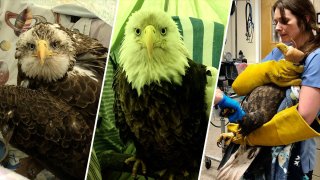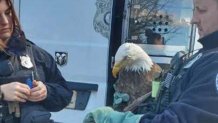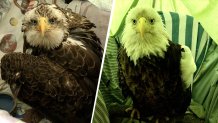
Deputy 1st Class Ethan Martin was driving in Loudoun County at the end of his shift last Friday when he noticed a number of cars pulled over on the side of the road.
Concerned that someone could be hurt, Martin pulled over on Sycolin Road. He found an injured bald eagle in the arms of a driver, according to Loudoun County police.
The eagle had been struck by a truck earlier that afternoon. Martin contacted Loudoun County Animal Services and the eagle was taken to veterinarians at the Blue Ridge Wildlife Center.
The wildlife center tested the eagle and found its lead levels were off the charts — too high for their machine to read. That indicated that the eagle was suffering from lead poisoning.

Eagles often become lead-poisoned by eating the meat of animals killed with lead bullets, the Blue Ridge Wildlife Center says. The bullet fragments can be found in the dead bodies of other animals that are being hunted or being shot as “nuisance animals."
About half of eagles that are admitted still have fragments of lead bullets in their stomachs.
Local
Washington, D.C., Maryland and Virginia local news, events and information
Lead poisoning can cause neurological problems, which often leads the eagles to get hit by cars, fly into buildings or pick fights with non-contaminated eagles.
The center was caring for a total of three eagles suffering from lead poisoning on Wednesday. The two others were found in Stafford County.

It took a few days for the Loudoun County eagle’s lead level to come down. But now she is eating on her own, the wildlife center said.
One of the eagles from Stafford County is fighting a kidney injury sustained from the toxic lead. The other is still healing a fractured ulna. Lead levels have come down in these eagles as well.
The Blue Ridge Wildlife Center implores hunters to use non-lead ammunition or recover and dispose of remains through deep burial or incineration.
This season has been particularly bad for lead in many species, according to the wildlife center. Center staff says that if anyone has an issue with unwanted wildlife near their home, they should contact them for advice on methods to naturally encourage the animals to move on.



